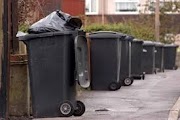Why not choose a model that works?
Back at the start of this summer, following a very
successful campaign by AAA-PBP, the government were forced to reverse the outrageous
plans of former minister Alan Kelly, to impose charges on Green Bin recycled
waste for the first time.
Alan Kelly’s plan, which effectively removed any
incentive for householders to recycle green waste, was almost certainly
prompted by the Private Waste Industry, who would be the only beneficiaries of
such a step. This was a retrograde step and would have done immense damage to
the environment had it been enforced.
The fact that the former minister even attempted such an
environmentally regressive measure reaffirms the urgent need to take all waste
collection and recycling services back into full public ownership and control.
It has become increasingly obvious that the private waste companies do not give
a damn about recycling or the environment – they are driven only by profit.
This point was compounded quite alarmingly when the
private companies attempted to increase charges by as much as 300% in some
parts of the country. Once again, in a move that reinforced the new strength of
the left in the Dáil and in the local councils, the government were forced to
intervene and put a temporary stop on the increases. Meanwhile, the waste
companies are to spend the next year “educating” the customers on the new
charging mechanisms.
This can be taken as Fine Gael speak for “we will bamboozle
the people with deliberately unclear mechanisms for measuring and charging for
waste, and once we have our foot in the door we will increase prices as and
when we feel like it – In other words the “Thin edge of the wedge”. Their
proposals will remove any pretence of a “Polluter Pays” policy or regard for environmental
protection. They want a base fee annually, regardless of what you put out and
pay by weight thereafter, for all bins.
At the moment people are being deliberately confused by
these privateers, with different offerings and various explanations of what
they can do. Consumers are to be forced to choose between a rock and a hard
place – between one rip off merchant and another.
The issues with these waste management and bin charges
are almost identical for rural and city dwellers. However there are a couple of
major, additional headaches, for those in rural Ireland.
Firstly, we face a distinct lack of choice. Many rural
areas are confined to one service provider only. So it’s like it or lump it on
the price. If you are not directly on their “route”, you will have to transport
your bins, typically 3, to a central collection point which may be a few miles
away. What will happen when the private companies decide that certain areas are
not economical to service? Your central collection point may end up being many,
many miles away. Different parts of the country are reporting various horror
stories when dealing with these companies.
History tells us that prices vary but inevitably follow
an upward trend. Regulation can be difficult to enforce in the Private Sector
due to the differing number of providers, tariffs etc. It is not inconceivable
to see scenarios where only certain bins are collected on certain days of certain
weeks. We cannot arrive at a situation where the people of Rural Ireland
suffer a sub-standard service, or no service at all, simply as a consequence of
where we live.
To date, privatisation of waste management services has
proven to be a disaster for all but the Waste Companies profit margins: For the
citizens who have incurred ever increasing charges, for the workers who face a
race to the bottom on wages and for the Environment because it has driven up
occurrences of illegal dumping. The privatisation of the service must be
reversed and it needs to be brought back into public ownership under the
control of the councils. If not, a never ending
cycle of charge increases will inevitably be the result, due to the voracious
desire of these companies to drive up their profits.
The
establishment will tell you “you can’t do it, it won’t work, how will you pay
for this”. Well, we can, it does work, and other countries are already doing
it.
Firstly,
let’s make the important point that Irish people have for some years now, shown
a real appetite for recycling and environmentally positive waste management.
Galway City Council, for one, have proven with published figures that, given
the proper encouragement and facilities, households will recycle as much as
possible. Figures from the council there show they have doubled the recycling
targets set by the EU. Having said that,
many EU countries are still well ahead of us on recycling and waste management
and even more so on their attitudes to same. Portugal, for example, this year
powered the country for 4 days entirely on renewable energy!
However,
I want to focus on another country in particular, which appears to be one
that’s really leading the way in this field. They have a waste model that we
should strive for, with immediate effect.
Sweden
has a population of 9.9 million and while you couldn’t call it a “socialist”
country, it has many socialist principles and socialist thinkers running it
(“Sweden leads by example in corporate social responsibility. “ is a bold
statement from its own website. www.sweden.se).
Waste
management in Sweden is paid for through general taxation. Bulky waste is
disposed of, for free, in recycling centres. Recycling stations for everyday
household waste are, as a rule, never more than 300 meters from a residential
area. In rural areas, it’s a little further but every effort is made to
accommodate the users.
In
1975 only 38% of household waste was recycled in Sweden.
Today 99% of all household waste is recycled as energy or materials. Renewable
sources now account for 52% of Swedish energy production. An excellent example
of innovative green thinking is the city of Stockholm. Every month, 993,000kg
of food waste is collected by the city. The waste is turned into 115,000m3 of
gas, which is used to fuel their buses and taxis.
So
how do we pay for it? We can maximise the potential for a return to the
exchequer - from recycling the waste material and reducing both our reliance on
imported fossil fuels and our energy bills, and as a side effect we create good
public service jobs in every community through green energy initiatives, all of
which feeds back into the local economy. A good number to remember is that three tons of waste
contains as much energy as one ton of fuel oil… so there is a lot of energy in
waste if reused properly. (source … Göran Skoglund, spokesperson for
Öresundskraft, one of the Swedens leading energy companies)
We
take the “for profit” merchants out of the picture. Instead of some politically
connected private entity creaming profit out at the top, an essential public
service becomes self-funding and fairly available to all in society, and the
environment is protected. Everyone wins. The Swedish model and many others in
Europe focuses on making the essential service a success for its citizens, and not
the profit making.
The inevitable
response from the establishment parties will be “If it’s all publicly funded,
you will have to raise taxes and everyone knows that Sweden is a high tax
country”. Relative to us at a base level,
yes, it is a little higher, but they also have considerably less stealth taxes
which impact the poorest people in society the hardest
(https://iea.org.uk/blog/the-consumption-taxes-that-keep-people-poor).
Also, as
any Swede will tell you, their services reflect the taxes. Their corporate tax is 22% and income from
capital is taxed at 30%. Norway proposes to come in line with that 22%
corporate rate by 2018. Guess what, neither country is in danger of closing
down. Quite the opposite. Our government are too weak to demand even our lowly
corporate rate of 12.5% be paid – in fact quite the opposite despite EU
rulings!
The
Swedes have shown what’s possible when waste management is freed from “for
profit” speculators, is focused purely on the environment, and by treating
household waste as an essential public service. This attitude is evident in all
major policies - they also protect other essential public services from
profiteering. i.e. Health, Education,
Housing & Transport. On the flip side, we pay for all these on top of our
taxes! The Civil War parties, cheer lead by another party of little
significance now, are all happy to put up the “For Sale” signs on all of our
Irish services.
We
need to fight that agenda at every hands turn.







